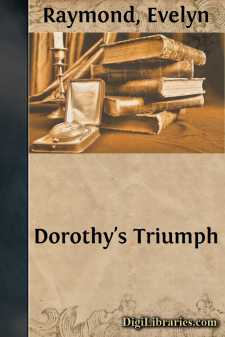Fiction
- Action & Adventure 182
- Biographical 15
- Christian 59
- Classics
- Coming of Age 4
- Contemporary Women 1
- Erotica 9
- Espionage/Intrigue 12
- Fairy Tales, Folklore & Mythology 235
- Family Life 169
- Fantasy 117
- Gay 1
- General 596
- Ghost 32
- Historical 808
- Horror 42
- Humorous 160
- Jewish 25
- Legal 4
- Medical 22
- Mystery & Detective 314
- Political 49
- Psychological 41
- Religious 64
- Romance 158
- Sagas 11
- Science Fiction 730
- Sea Stories 113
- Short Stories (single author) 537
- Sports 10
- Suspense 1
- Technological 8
- Thrillers 2
- Urban Life 29
- Visionary & Metaphysical 1
- War & Military 173
- Westerns 199
Classics Books
Sort by:
by:
Evelyn Raymond
CHAPTER I ON THE TRAIN “Maryland, my Maryland!” dreamily hummed Dorothy Calvert. “Not only your Maryland, but mine,” was the resolute response of the boy beside her. Dorothy turned on him in surprise. “Why, Jim Barlow, I thought nothing could shake your allegiance to old New York state; you’ve told me so yourself dozens of times, and—” “I know, Dorothy; I’ve thought so myself, but...
more...
The text of the present issue of Lord Byron's Poetical Works is based on that of 'The Works of Lord Byron', in six volumes, 12mo, which was published by John Murray in 1831. That edition followed the text of the successive issues of plays and poems which appeared in the author's lifetime, and were subject to his own revision, or that of Gifford and other accredited readers. A more...
more...
by:
Marie de France
I PROLOGUE BY WAY OF DEDICATION Those to whom God has given the gift of comely speech, should not hide their light beneath a bushel, but should willingly show it abroad. If a great truth is proclaimed in the ears of men, it brings forth fruit a hundred-fold; but when the sweetness of the telling is praised of many, flowers mingle with the fruit upon the branch. According to the witness of Priscian, it...
more...
CHAPTER I "Are you coming in to watch the dancing, Lady Conway?" "I most decidedly am not. I thoroughly disapprove of the expedition of which this dance is the inauguration. I consider that even by contemplating such a tour alone into the desert with no chaperon or attendant of her own sex, with only native camel drivers and servants, Diana Mayo is behaving with a recklessness and...
more...
ADVERTISEMENT. [Prefaced to Edition issued in 1808, edited by Sir Walter Scott.] After the lapse of more than a century since the author's death, the Works of Dryden are now, for the first time, presented to the public in a complete and uniform edition. In collecting the pieces of one of our most eminent English classics,—one who may claim at least the third place in that honoured list, and who...
more...
by:
John S. Sargent
INTRODUCTORY NOTE. Emile Verhaeren, remarkable among of the brilliant group of writers representing "Young Belgium," and one who has been recognized by the literary world of France as holding a foremost place among the lyric poets of the day was born at St. Amand, near Antwerp, in 1855. His childhood was passed on the banks of the Scheldt, in the midst of the wide-spreading Flemish plains, a...
more...
I A swarm of children was playing on the damp floor of the shaft. They hung from the lower portions of the timber-work, or ran in and out between the upright supports, humming tunes, with bread-and-dripping in their hands; or they sat on the ground and pushed themselves forward across the sticky flagstones. The air hung clammy and raw, as it does in an old well, and already it had made the little...
more...
by:
Anthony Trollope
CHAPTER I GANGOIL. Just a fortnight before Christmas, 1871, a young man, twenty-four years of age, returned home to his dinner about eight o'clock in the evening. He was married, and with him and his wife lived his wife's sister. At that somewhat late hour he walked in among the two young women, and another much older woman who was preparing the table for dinner. The wife and the wife's...
more...
INTRODUCTION It is a melancholy but instructive fact to remember that, in the opinion of him whom nature had adorned with the greatest intellect that the world has yet seen, selfishness and self-interest lie at the root of all human action. "For," as Napoleon said, "in ambition is to be found the chief motive force of humanity, and a man puts forth his best powers in proportion to his hopes...
more...
by:
Samuel A. Binion
CHAPTER I. In Tyniec,[1] in the inn under "Dreadful Urus," which belonged to the abbey, a few people were sitting, listening to the talk of a military man who had come from afar, and was telling them of the adventures which he had experienced during the war and his journey. He had a large beard but he was not yet old, and he was almost gigantic but thin, with broad shoulders; he wore his hair...
more...











